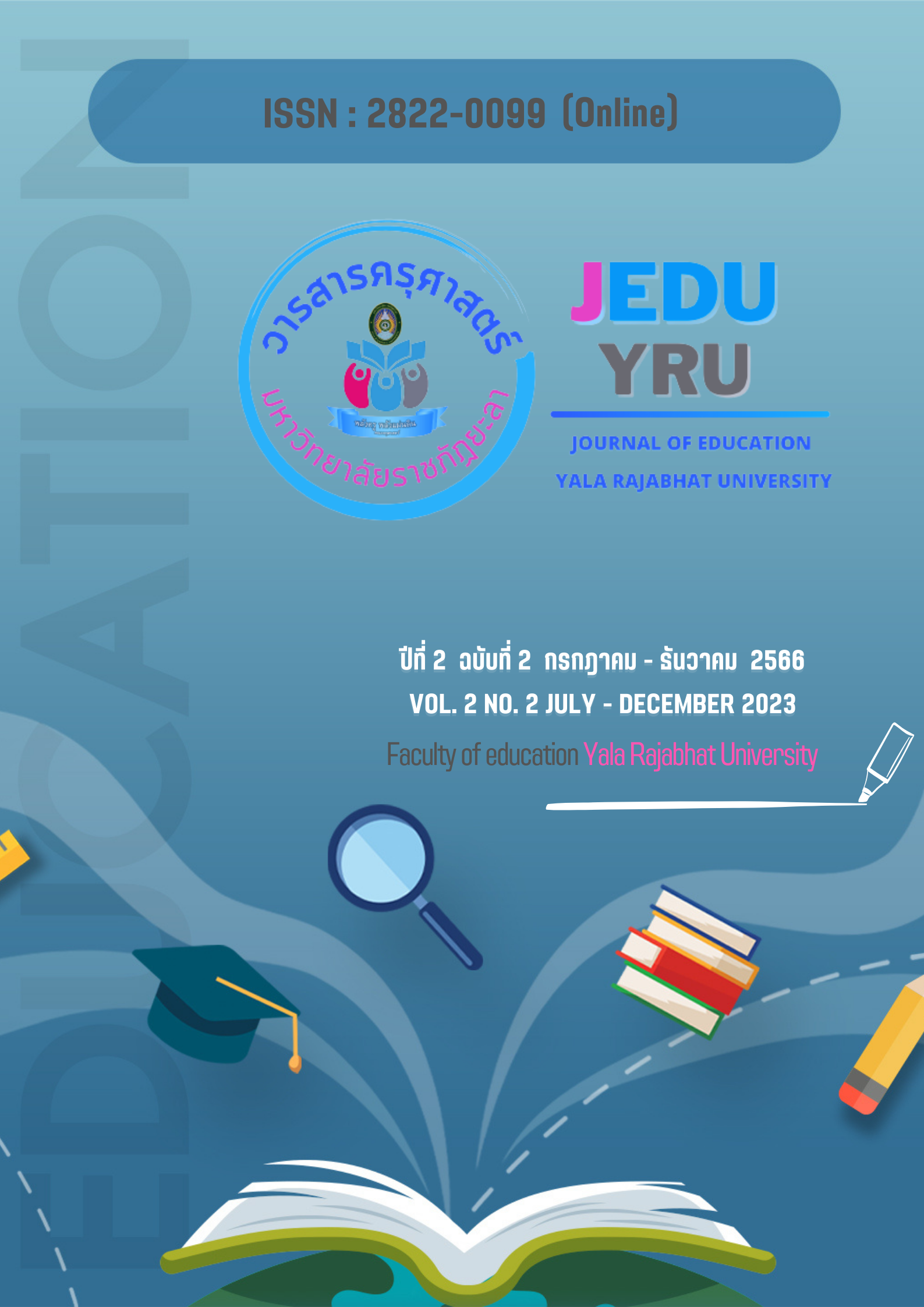State of Islamic Ethics Implementation at Iqra Muslim School, Bangkok
Main Article Content
Abstract
Application of Islamic ethics in the functioning of educational institutions is necessary for school administration and management to succeed in this world and the hereafter. This study aims to examine the state of Islamic ethics implementation at Iqra Muslim school, Bangkok. The key informants comprise 25 persons, namely, the head of the group subject, the head of the class level, and the head of the Tarbiyyah unit (morality and ethics promotion unit). This study employed a qualitative research design and used Iqra Muslim school, Bangkok as a unit of analysis. Questions from interviews and focus groups served as the research instruments. Using content analysis, the collected data was examined by first classifying it into primary issues and sub-issues based on the subjects of the interviews and focus groups. A diagram was then created by synthesizing the data to show how the entire data was connected. A descriptive presentation of the data was made regarding the state of Islamic ethics implementation at Iqra Muslim School, Bangkok. The results of the research revealed that Iqra Muslim School, Bangkok, operates in an Islamic environment that focuses on Islam as the base of management (Islamic-Based Management), instilling the school administrators, teachers, staff, and personnel by stimulating them (targheeb) to see the value of their work by seeking Allah’s satisfaction, chasing merit, and seeking success both in this world and the next world. Positive encouragement was provided through hadiyah (reward). The school sets clear religious and general policies, and it has a common goal: to create an excellent nation (Ummah al-Wustaa). In addition, the school focuses on personnel development, work instruction, work distribution, and continuous follow-up work. The school has a system for disbursement of materials, equipment, and various budgets; a system for checking, summarizing, and evaluating the work clearly; and all these things have been done through prominent activities and practices that inspire everyone to value the identity of an Islamic school.
Article Details
References
กวี เจ๊ะหมัด และ นพรัตน์ ชัยเรือง. (2558). พฤติกรรมการบริหารตามหลักธรรมาภิบาลของผู้บริหารสถานศึกษาเอกชนสอนศาสนาอิสลาม ในจังหวัดนครศรีธรรมราช. วารสารมหาวิทยาลัยนราธิวาสราชนครินทร์ สาขามนุษยศาสตร์และสังคมศาสตร์, 2(1), 22-33.
กิตติภูมิ สมศรี. (2560). แนวทางการบริหารการศึกษาตามหลักธรรมาภิบาลของผู้บริหารสังกัด สำนักงานคณะกรรมการอาชีวศึกษา จังหวัดอุทัยธานี. วิทยานิพนธ์ปริญญาครุศาสตร์มหาบัณฑิต สาขาวิชาบริหารการศึกษา. มหาวิทยาลัยราชภัฏนครสวรรค์.
จักรพันธุ์ จันทร์เจริญ. (2561). การศึกษาคุณธรรมจริยธรรมสำหรับครูของอาจารย์ในคณะครุศาสตร์และคณะศึกษาศาสตร์ในมหาวิทยาลัยกลุ่มจังหวัดร้อยแก่นสารสินธุ์. วารสารบัณฑิตศึกษา มหาวิทยาลัยราชภัฏวไลยอลงกรณ์ ในพระบรมราชูปถัมภ์, 12(3), 27-42.
จารุณี เก้าเอี้ยน. (2561). การพัฒนารูปแบบการบริหารสถานศึกษาตามหลักธรรมาภิบาลของผู้บริหารโรงเรียนเอกชนสอนศาสนาอิสลามในบริบทสังคมพหุวัฒนธรรมในสามจังหวัด ชายแดนภาคใต้. วารสารมหาวิทยาลัยราชภัฏยะลา, 13(1), 27-40.
จรรยา โต๊ะตาเหยะ. (2558). คุณธรรมจริยธรรมของผู้บริหารโรงเรียนเอกชนสอนศาสนาอิสลามในจังหวัดนครศรีธรรมราช. วิทยานิพนธ์ปริญญาครุศาสตรมหาบัณฑิต สาขาวิชาการริหารการศึกษา. มหาวิยาลัยราชภัฏนครศรีธรรมราช.
จอมพงศ์ มงคลวนิช. (2555). การบริหารองค์การและบุคลากรทางการศึกษา. กรุงเทพฯ: จุฬาลงกรณ์มหาวิทยาลัย.
ซารีล่า ลาหมีด และคณะ. (2559). การบริหารตามหลักธรรมาภิบาลของผู้บริหารตามทัศนะของครูโรงเรียนเอกชนสอนศาสนาอิสลาม สังกัดสำนักงานการศึกษาเอกชนจังหวัดสตูล. การประชุมหาดใหญ่วิชาการระดับชาติและนานาชาติ ครั้งที่ 7. (น. 258-259), 23 มิถุนายน 2559. สงขลา: มหาวิทยาลัยหาดใหญ่.
เทวพร ขำเมธา. (2558). การบริหารแบบมีส่วนร่วมของโรงเรียนในกลุ่มสระยายโสม สังกัดสำนักงานเขตพื้นที่การศึกษาประถมศึกษาสุพรรณบุรี เขต 2. การค้นคว้าอิสระปริญญาศึกษาศาสตรมหาบัณฑิต. มหาวิทยาลัยศิลปากร.
นิเลาะ แวอุเซ็ง. (2559). การจัดการศึกษาในอิสลาม แนวคิดสู่การปฏิบัติ. ปัตตานี: โรงพิมพ์มิตรภาพ.
ปิลันธนา แป้นปลื้ม และ วิโรจน์ เจษฎาลักษณ์. (2560). อิทธิพลของความยุติธรรมในองค์การต่อผลการปฏิบัติงานตามบทบาทหน้าที่ผ่านการรับรู้การสนับสนุนนจากองค์การ. วารสารอิเล็กทรอนิกส์การเรียนรู้ทางไกลเชิงนวัตกรรม, 7(1), 58-59.
พรเทพ เหมรานนท์. (2564). การบริหารแบบมีส่วนร่วมของผู้บริหารสถานศึกษาที่ส่งผลต่อประสิทธิผลของสถานศึกษา สังกัดสำนักงานเขตพื้นที่การศึกษาประถมศึกษาจันทบุรี เขต 1 และเขต 2. วิทยานิพนธ์ปริญญาครุศาสตรมหาบัณฑิต. มหาวิทยาลัยราชภัฏรำไพพรรณี.
พรรณอร อุชุภาพ. (2561). การศึกษาและวิชาชีพครู. กรุงเทพฯ : สำนักพิมพ์แห่งจุฬาลงกรณ์มหาวิทยาลัย.
ไพรวัลย์ เหล็งสุดใจ และ ประเสริฐ อินทร์รักษ์. (2557). จรรยาบรรณวิชาชีพผู้บริหารโรงเรียน. วารสารศิลปากรศึกษาศาสตร์วิจัย, 6(2), 96.
ภาคภูมิ ฤกขะเมธ. (2560). การนำการปรึกษาหารือมาใช้ในการวิเคราะห์นโยบายสาธารณะ: การทบทวนสำหรับแนวทางในเชิงปฏิบัติ. วารสารสถาบันพระปกเกล้า, 15(3), 19-37.
มีรฟัต มะยูโซ๊ะ. (2551). แบบอย่างทางจริยธรรมของครูอิสลามศึกษาในโรงเรียนประถมศึกษา จังหวัดนราธิวาส จากทัศนะของผู้บริหารและครูอิสลามศึกษา. วิทยานิพนธ์ปริญญาศิลปศาสตรมหาบัณฑิต สาขาวิชาอิสลามศึกษา. มหาวิยาลัยสงขลานครินทร์ วิทยาเขตปัตตานี.
มูนีเราะห์ สาและอาแร. (2561). การบริหารโรงเรียนตามหลักการบริหารจัดการทีดีในอิสลามของผู้บริหารโรงเรียนเอกชนสอนศาสนาอิสลามในจังหวัดนราธิวาส. วิทยานิพนธ์ปริญญาศึกษาศาสตรมหาบัณฑิต สาขาวิชาการบริหารและการจัดการการศึกษาอิสลาม. มหาวิทยาลัยสงขลานครินทร์ วิทยาเขตปัตตานี.
สำนักงานเลขาธิการสภาผู้แทนราษฎร. (2560). รัฐธรรมนูญแห่งราชอาณาจักรไทย [ออนไลน์]. ค้นเมื่อ 20 กันยายน 2565, จาก : https://cdc.parliament.go.th/.
สุธันยชนก ทรัพย์ย้อย. (2558). บทบาทของผู้บริหารสถานศึกษาในการบริหารงานพัฒนาคุณธรรมจริยธรรมในสถานศึกษาขั้นพื้นฐาน สังกัดสำนักงานเขตพื้นที่การศึกษาประถมศึกษากาญจนบุรี เขต 2. การค้นคว้าอิสระปริญญาหลักสูตรครุศาสตรมหาบัณฑิต สาขาวิชาการบริหารการศึกษา. มหาวิทยาลัยราชภัฏกาญจนบุรี.
อาคม มากมีทรัพย์. (2556). จริยธรรมผู้บริหารสถานศึกษา. วิทยานิพนธ์ปรัชญาดุษฎีบัณฑิต สาขาวิชาการบริหารการศึกษาภาควิชาการบริหารการศึกษา มหาวิทยาลัยศิลปากร.
อิสมาแอล เจะเล็ง. (2556). บทบาทของผู้บริหารในการส่งเสริมคุณธรรม จริยธรรมของผู้เรียนในโรงเรียนเอกชนสอนศาสนาอิสลาม สังกัดสำนักงานการศึกษาเอกชนจังหวัดปัตตานี. วิทยานิพนธ์ปริญญาศึกษาศาสตรมหาบัณฑิต สาขาวิชาการบริหารและการจัดการการศึกษาอิสลาม. มหาวิทยาลัยสงขลานครินทร์ วิทยาเขตปัตตานี.
ไอยุป เจริญสุข. (2557). ความสัมพันธ์ระหว่างการบริหารตามหลักราชวสดีธรรมกับการบริหารตามหลักอิสลามของโรงเรียนเอกชนสอนศาสนาอิสลาม ในกรุงเทพมหานครและนนทบุรี. วิทยานิพนธ์ปริญญาครุศาสตรมหาบัณฑิต สาขาวิชาการบริหารการศึกษา. มหาวิทยาลัยราชภัฏธนบุรี.
Abdul Rahim Chandio, Iqbal Ameen Brohi, and Ghulam Nabi Gadhi. (2019). Administrative Ethics with Special Reference to Islam. Global Scientific Journal, 7(7), 913-923.
Manar Mansour Ahmad Mansour. (2015). The degree to which a school principal practices ethical leadership and its impact on climate of organizational structure from the point of view of primary school teachers in Taif Province. Majallat buhuth altarbiat alnaweiat - Jamieat almansura, 12(39). 128-139.
Melala, I. (2019). The impact of Islamic work ethics on quality : Case study on Sonaric Company. Economic Researcher Review (CHEEC), 7(11). 182-195.
Misbah Mansur Musaa Mutawie. (2016). Aldaabit al'akhlaqiu fi aleamal al'iidarii min manzur 'iislami. Yearbook of the College of Islamic and Arabic Studies for Girls in Zagazig, 2016(6), 1999-2010.
Mofareh Saeed Alkadem, Abdulaziz Saeed Alqahtani. (2016). Educational Management in the Light of Islamic Standards. British Journal of Education, Society & Behavioral Science, 14(3), 4-5.
Mohamad Johdi Salleh, Nazifah Alwani Mohamad. (2012). Islamic Principle of Administration: Implication on Practices in Organization. Technology, Science, Social Sciences and Humanities International Conference. (p. 1-12), 14-15 November 2012. Langkawi : Universiti Teknologi MARA Kedah.
Ogunbado, A. F. & Al-Otaibi, A. M. (2013). Is Quality Management An Islamic Value?. IOSR Journal of Business and Management, 8(3), 9-10.
Putu Evvy, R. S., Achmad, S., Armanu & Solimun. (2018). Ikhlas behavior as the influence moderator of competence and climate of school organization on performance of teachers. Russian Journal of Agricultural and Socio-Economic Sciences (RJOAS), 5(77), 65-73.
Rokman, W., & Hassan, A. (2012). The effect of Islamic work ethic on organisational justice. African Journal of Business Ethics, 6(1), 25-29.
Shahrul Nizam bin Salahudin, Siti Sarah binti Baharuddin, Muhammad Safizal, Abdullah, Abdullah Osman. (2016). The Effect of Islamic Ethics on Organizational Commitment. Procedia Economics and Finance, 35(2016), 582-590.
Souad, B. (2020). The role of Moral Values in building character of administration leader from an Islamic Perspective. Jakarta: Majallah Dirasaat Iqtisodiyah.


